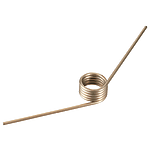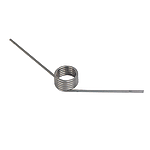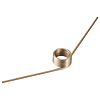(!)NOTE : Windows 7 users won’t be able to use some latest features of eCatalog/WOS since Microsoft is ending support for Windows 7 on 14 Jan, 2020. Please upgrade your system for uninterrupted services.
- Notice of End of Sales for Economy Series Pneumatic Equipment Category. More information.
SAMINI Torsion Springs(Inner Dia. ID:Ø9)
Brand |
|
|---|---|
| CAD |
|
| Days to Ship |
|
1 items
- Sort By
-
You can add up to 6 items per a category to the compare list.



SAMINI
· SAMINI Torsion Springs-Arm angles of 90°/135°/180°.
· The series including of 33 and 34 types.
· Material: Stainless Steel (SUS304-WPB)
· Arm Angle: 90°/135°/180°.
· Type of Arm Angle: Right-hand coil and Left-hand coil.
· Inner Diameter: 3, 4, 5, 6, 7, 8, 9, 10, 12, 14, 16 and 18.
· Number of Winding n: 2, 3 and 5.
· Torsion springs are used in various applications such as automotive, aerospace, industrial machinery, and electrical devices.
· Idlers for Flat Belts (Width T=6–32)-Flanged / Crowned.- Volume Discount
- CAD :
- 3D
Free Angle θ Environmentally friendly Inner Dia. ID Characteristics/Applications Helix Angle φd2(deg) Wire Dia. d(Ø) Number of Winding n Spring Constant k(N・mm/deg) Material Cleaning Method 90° Right Winding Coil / 135° Right Winding Coil / 180° Right Winding Coil / 90° Left Winding Coil / 135°Left Winding Coil / 180°Left Winding Coil - Ø9 - 32 ~ 131 0.9 ~ 1.4 2 / 3 / 5 0.64 ~ 9.37 Stainless Steel - From: ₹ 351.31 Days to Ship: 5 Day(s) or more  5 Day(s) or more
5 Day(s) or more
| Brand |
|---|
| Product Series |
| CAD |
| From |
| Days to Ship |
| Free Angle θ |
| Environmentally friendly |
| Inner Dia. ID |
| Characteristics/Applications |
| Helix Angle φd2(deg) |
| Wire Dia. d(Ø) |
| Number of Winding n |
| Spring Constant k(N・mm/deg) |
| Material |
| Cleaning Method |
You can add up to 6 items per a category to the compare list. | |
| Brand | SAMINI |
| Product Series | |
| CAD |
|
| From | ₹ 351.31- |
| Days to Ship | 5 Day(s) or more |
| Free Angle θ | 90° Right Winding Coil / 135° Right Winding Coil / 180° Right Winding Coil / 90° Left Winding Coil / 135°Left Winding Coil / 180°Left Winding Coil |
| Environmentally friendly | - |
| Inner Dia. ID | Ø9 |
| Characteristics/Applications | - |
| Helix Angle φd2(deg) | 32 ~ 131 |
| Wire Dia. d(Ø) | 0.9 ~ 1.4 |
| Number of Winding n | 2 / 3 / 5 |
| Spring Constant k(N・mm/deg) | 0.64 ~ 9.37 |
| Material | Stainless Steel |
| Cleaning Method | - |
Loading...
Configure
Specification/Dimensions
-
Free Angle θ
-
Environmentally friendly
-
Inner Dia. ID
-
Characteristics/Applications
-
Helix Angle φd2(deg)
- 23
- 24
- 25
- 26
- 27
- 28
- 29
- 30
- 31
- 32
- 33
- 34
- 35
- 36
- 37
- 38
- 39
- 40
- 41
- 42
- 43
- 44
- 45
- 46
- 47
- 48
- 49
- 50
- 51
- 52
- 53
- 54
- 55
- 56
- 57
- 58
- 59
- 60
- 61
- 62
- 63
- 64
- 65
- 66
- 67
- 68
- 69
- 70
- 71
- 72
- 73
- 74
- 75
- 75(0.6) 54(0.8)
- 76
- 77
- 78
- 79
- 80
- 81
- 82
- 83
- 84
- 85
- 86
- 87
- 88
- 89
- 90
- 91
- 92
- 93
- 94
- 95
- 96
- 97
- 98
- 99
- 100
- 101
- 102
- 103
- 104
- 105
- 106
- 107
- 108
- 109
- 110
- 111
- 112
- 114
- 115
- 116
- 119
- 122
- 125
- 128
- 131
- 134
- 135
- 137
- 140
- 144
-
Wire Dia. d(Ø)
-
Number of Winding n
-
Spring Constant k(N・mm/deg)
- 0.0088
- 0.0090
- 0.0093
- 0.0115
- 0.0119
- 0.0124
- 0.02
- 0.024
- 0.025
- 0.0289
- 0.0295
- 0.03
- 0.0302
- 0.0304
- 0.0314
- 0.0345
- 0.0354
- 0.0363
- 0.038
- 0.0387
- 0.04
- 0.0403
- 0.042
- 0.0428
- 0.0441
- 0.0455
- 0.05
- 0.055
- 0.056
- 0.0563
- 0.058
- 0.0586
- 0.059
- 0.0611
- 0.0617
- 0.062
- 0.0630
- 0.0643
- 0.07
- 0.0722
- 0.073
- 0.0736
- 0.0744
- 0.075
- 0.0755
- 0.076
- 0.0774
- 0.08
- 0.0882
- 0.09
- 0.091
- 0.0912
- 0.0918
- 0.0920
- 0.094
- 0.0955
- 0.0970
- 0.098
- 0.0996
- 0.1
- 0.1054
- 0.1080
- 0.11
- 0.1108
- 0.112
- 0.1138
- 0.115
- 0.1161
- 0.118
- 0.1185
- 0.1199
- 0.12
- 0.122
- 0.1248
- 0.127
- 0.13
- 0.1301
- 0.131
- 0.134
- 0.1357
- 0.1368
- 0.137
- 0.139
- 0.1409
- 0.141
- 0.1425
- 0.1454
- 0.1471
- 0.148
- 0.15
- 0.1501
- 0.1533
- 0.16
- 0.1680
- 0.17
- 0.173
- 0.1732
- 0.1756
- 0.177
- 0.1787
- 0.1793
- 0.1799
- 0.18
- 0.181
- 0.184
- 0.1845
- 0.1866
- 0.1894
- 0.190
- 0.191
- 0.192
- 0.1933
- 0.194
- 0.1944
- 0.1974
- 0.199
- 0.2
- 0.21
- 0.217
- 0.22
- 0.2206
- 0.224
- 0.225
- 0.2259
- 0.229
- 0.2296
- 0.23
- 0.2314
- 0.2315
- 0.235
- 0.2363
- 0.2373
- 0.2394
- 0.2413
- 0.2436
- 0.2512
- 0.256
- 0.26
- 0.271
- 0.272
- 0.2763
- 0.279
- 0.2797
- 0.28
- 0.2831
- 0.286
- 0.288
- 0.2883
- 0.29
- 0.2903
- 0.2974
- 0.301
- 0.302
- 0.306
- 0.309
- 0.3099
- 0.313
- 0.316
- 0.319
- 0.32
- 0.3224
- 0.332
- 0.3360
- 0.34
- 0.35
- 0.352
- 0.36
- 0.361
- 0.3672
- 0.376
- 0.3821
- 0.391
- 0.3983
- 0.4
- 0.403
- 0.41
- 0.426
- 0.43
- 0.440
- 0.443
- 0.45
- 0.453
- 0.457
- 0.461
- 0.469
- 0.47
- 0.472
- 0.476
- 0.487
- 0.4939
- 0.498
- 0.5041
- 0.506
- 0.5147
- 0.52
- 0.522
- 0.527
- 0.552
- 0.56
- 0.57
- 0.5811
- 0.582
- 0.587
- 0.5891
- 0.5931
- 0.596
- 0.6037
- 0.6056
- 0.61
- 0.611
- 0.6190
- 0.63
- 0.635
- 0.640
- 0.65
- 0.656
- 0.67
- 0.672
- 0.68
- 0.682
- 0.6936
- 0.699
- 0.703
- 0.7108
- 0.715
- 0.716
- 0.72
- 0.726
- 0.7289
- 0.7299
- 0.744
- 0.75
- 0.7523
- 0.755
- 0.77
- 0.7762
- 0.787
- 0.791
- 0.8
- 0.802
- 0.822
- 0.83
- 0.84
- 0.843
- 0.87
- 0.878
- 0.900
- 0.922
- 0.94
- 0.9590
- 0.96
- 0.978
- 0.9981
- 1.02
- 1.03
- 1.04
- 1.0406
- 1.05
- 1.07
- 1.08
- 1.10
- 1.11
- 1.12
- 1.13
- 1.15
- 1.1765
- 1.18
- 1.19
- 1.2008
- 1.21
- 1.2262
- 1.23
- 1.30
- 1.31
- 1.32
- 1.34
- 1.35
- 1.36
- 1.38
- 1.40
- 1.4045
- 1.41
- 1.42
- 1.4394
- 1.44
- 1.45
- 1.4760
- 1.48
- 1.49
- 1.52
- 1.53
- 1.54
- 1.56
- 1.58
- 1.59
- 1.592
- 1.62
- 1.68
- 1.686
- 1.69
- 1.73
- 1.77
- 1.79
- 1.80
- 1.84
- 1.87
- 1.88
- 1.96
- 1.98
- 2.01
- 2.03
- 2.05
- 2.06
- 2.08
- 2.09
- 2.11
- 2.17
- 2.18
- 2.23
- 2.28
- 2.29
- 2.3
- 2.31
- 2.32
- 2.34
- 2.41
- 2.42
- 2.44
- 2.45
- 2.47
- 2.50
- 2.51
- 2.53
- 2.55
- 2.57
- 2.65
- 2.66
- 2.81
- 2.82
- 2.86
- 2.91
- 2.93
- 2.95
- 3.12
- 3.17
- 3.18
- 3.22
- 3.26
- 3.28
- 3.30
- 3.34
- 3.41
- 3.42
- 3.44
- 3.51
- 3.52
- 3.54
- 3.57
- 3.60
- 3.61
- 3.62
- 3.66
- 3.69
- 3.75
- 3.78
- 3.8
- 3.81
- 3.89
- 3.95
- 3.98
- 4.05
- 4.11
- 4.13
- 4.18
- 4.22
- 4.28
- 4.45
- 4.46
- 4.58
- 4.59
- 4.63
- 4.66
- 4.77
- 4.85
- 4.89
- 5.05
- 5.08
- 5.12
- 5.16
- 5.17
- 5.23
- 5.25
- 5.26
- 5.37
- 5.38
- 5.44
- 5.46
- 5.47
- 5.54
- 5.59
- 5.62
- 5.70
- 5.72
- 5.73
- 5.77
- 5.81
- 5.95
- 6.00
- 6.04
- 6.14
- 6.25
- 6.30
- 6.33
- 6.39
- 6.41
- 6.42
- 6.44
- 6.58
- 6.74
- 6.85
- 7
- 7.03
- 7.35
- 7.5
- 7.52
- 7.53
- 7.60
- 7.72
- 7.82
- 8.04
- 8.15
- 8.23
- 8.28
- 8.33
- 8.39
- 8.55
- 8.59
- 8.6
- 8.61
- 8.80
- 8.82
- 8.89
- 8.96
- 9.02
- 9.17
- 9.25
- 9.37
- 9.44
- 9.55
- 9.64
- 9.66
- 9.8
- 9.90
- 10.2
- 10.4
- 10.8
- 10.9
- 11.06
- 11.2
- 11.3
- 11.5
- 11.52
- 11.8
- 11.9
- 12.0
- 12.2
- 12.4
- 12.7
- 12.9
- 13.3
- 13.5
- 13.6
- 13.9
- 14.0
- 14.3
- 14.4
- 14.53
- 15.0
- 15.49
- 15.6
- 15.9
- 16.2
- 16.9
- 17.2
- 17.6
- 18.2
- 19.3
- 20.0
- 20.36
- 21.2
- 21.5
- 22.4
- 22.5
- 22.6
- 23.3
- 23.7
- 23.9
- 24.3
- 24.9
- 25.4
- 27.2
- 28.1
- 31.1
- 32.7
- 32.9
- 33.5
- 34.0
- 34.3
- 35.0
- 35.6
- 38.3
- 39.9
- 41.5
- 52.8
- 53.6
- 54.9
- 55.4
- 57.2
- 58.6
- 62.3
- 76.3
- 80.8
- 85.8
-
Material
- Stainless Steel
- Steel
-
Cleaning Method
- Degreasing
- Precision Cleaning
- Electrolytic Polishing + Precision Cleaning
Narrow search by specifying Manufacturer
Related Categories to Torsion Springs
FAQ Torsion Springs
- Question: How do I know what torsion spring I need for my work?
- Answer: To determine the appropriate torsion spring for your work, you need to consider factors such as required torque, angular deflection, wire diameter, coil diameter, and leg length. Calculating these parameters using spring design equations or consulting with a mechanical engineer can help identify the specific torsion spring that meets your application's requirements.
- Question: How do you calculate the torque of a torsion spring?
- Answer: To calculate the torque of a torsion spring, you need to know the spring constant (k) and the angular deflection (θ). The torque (M) can be calculated using the formula: M = k * θ. The spring constant is determined by the material properties and spring geometry, while the angular deflection is the amount of twist applied to the spring.
- Question: Types of Torsion Springs?
- Answer: There are several types of torsion springs, each designed to meet specific application requirements. Some common types include:
Straight Torsion Springs: These are the most basic type of torsion springs, consisting of a straight, helical coil. They exert torque when twisted around the axis of the coil.
Double Torsion Springs: Double torsion springs consist of two separate coils connected by a central section. They are used when torque needs to be applied in two directions simultaneously, such as in automotive applications like trunk lids or in certain types of hinges.
Short Hook Torsion Springs: Short hook torsion springs have short end hooks that allow for easy attachment to other components. They are commonly used in applications where space is limited, such as in small electronic devices or medical equipment.
Hinge Torsion Springs: Hinge torsion springs are designed specifically for use in hinges, providing the necessary torque to operate the hinge mechanism smoothly. They are commonly used in doors, lids, and other swinging mechanisms.
Clock Springs: Clock springs, also known as spiral torsion springs, are tightly wound coils that exert torque in a spiral motion. They are commonly used in mechanical clocks, watches, and other timekeeping devices.
Tapered Torsion Springs: Tapered torsion springs have a varying coil diameter along their length, which allows for a more gradual torque application. They are used in applications where a constant rate of torque is required throughout the rotation.
Custom Torsion Springs: In addition to standard types, torsion springs can be custom-designed to meet specific application requirements. Customization options include varying the size, shape, material, and other design parameters to achieve the desired performance characteristics. - Question: What factors affect the lifespan of a torsion spring?
- Answer: The lifespan of a torsion spring is influenced by several factors. These include the quality of the spring material, the design and manufacturing process, the applied load and stress levels, the frequency and magnitude of cycles, environmental conditions (such as temperature and corrosive agents), proper installation and maintenance practices, and the avoidance of excessive overloading or fatigue conditions.
- Question: How do you install and maintain a torsion spring?
- Answer: To install a torsion spring, mount it securely on the shaft, ensuring proper alignment and balance. Apply appropriate lubrication to minimize friction and wear. Maintain the spring by regularly inspecting for signs of fatigue, wear, or damage. Replace worn or damaged springs promptly. Keep the spring clean and free from debris. Follow manufacturer guidelines and recommended maintenance practices for optimal performance and longevity.














How can we improve?
How can we improve?
Thank you for your time.
Your feedback is essential for our continuous improvement
Privacy Policy
Thank you for your cooperation.
Thank you for your time.
Your feedback is essential for our continuous improvement
Please use the inquiry form.
Privacy Policy